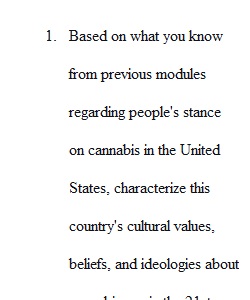


Q Based on what you know from previous modules regarding people's stance on cannabis in the United States, characterize this country's cultural values, beliefs, and ideologies about cannabis use in the 21st century. It is appropriate to use data/ statistics for this response. Assess the evolution of cannabis culture, both in terms of its material and non-material culture, drawing from what you learned about the 20th century and comparing it to where we are today. What is different today? How do you know it is different? What is the same, if anything? This portion of your response should be grounded in the data and the source material from the course. Anecdotes (personal stories) are OK, but should not constitute the majority of this analysis. Drawing on all your knowledge surrounding cannabis access, consumption, and culture, what tensions do you see between "ideal culture" and "real culture?" Referencing what you learned from the module on racism and criminalization, what type of analysis is missing from the article on cannabis tourism? What types of studies and research should we be doing with regard to cannabis culture, to get a more nuanced and well-rounded perspective? Do you recognize a "cultural lag" between how fast cannabis culture is evolving and how quickly society's norms, rules, (and even research) are able to catch up?
View Related Questions